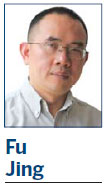EU cannot afford to miss out on bank
By joining the China-led institution, Brussels can create parity in the global financial system
Brussels is remaining tight-lipped ahead of the looming March 31 deadline for countries to apply for founding membership of the China-proposed Asian Infrastructure Investment Bank.
Despite this silence, Switzerland and European Union member countries including the United Kingdom, Germany, France, Luxembourg and Italy are supporting Beijing's initiative to mobilize resources to improve Asia's infrastructure.
The decision of these European countries, which has annoyed the United States, may see the number of would-be founding members exceed 35 when the deadline arrives.

It is to some extent understandable if Washington does not change its stance and back Beijing's initiative. The world's biggest power is intolerant of China's rise and is unwilling to accept new ideas from emerging economies.
However, the EU may lose opportunities on several fronts if it does not become part of AIIB's foundation.
First, it is about having a voice.
It is true that restructuring reforms in the World Bank and International Monetary Fund are not efficiently implemented. The influence of emerging economies, such as China, has not increased, though such efforts have started since the global financial crisis of 2007-2008.
The Wall Street Journal reported that the US and Europe are to blame for China forming its own development bank, after the Asian power was neglected in the structures of existing international banks.
Kristalina Georgieva, vice-president of the European Commission, says in the article that China is aggressively stepping into an area where if "we paid more attention, we would have had more normal relationships".
Georgieva has shown vision, hinting that Brussels may regret eschewing AIIB membership.
The EU has been an active player in fighting the dollar's dominance of the global financial system since it introduced the euro at the start of this century. And if it starts to support the efforts of emerging economies, the global financial system will become fairer.
Secondly, it is about bonding.
The two continents have deepened their cooperation by setting up the Asia-Europe Meeting Mechanism where dozens of leaders meet every two years. The previous meeting was held in Milan, Italy, in October and participating countries have called for better connectivity between Asia and Europe by beefing up infrastructure construction.
To turn such calls into action, the formation of such a bank is necessary. Research has shown that every year, more than $720 billion of capital is needed to satisfy Asia's needs in infrastructure backlog. But the World Bank and Asia Development Bank cannot provide all this funding.
So there is good reason for the two continents to deepen relations, and for the EU to join the AIIB as a founding member.
Thirdly, it is about the complementary nature of relations between Asia and Europe, which is advanced in the field of green technology and other innovative solutions. The official involved in forming AIIB has said the institution will be efficient, clean and green.
By being green, European technologies and solutions will be widely used in Asia's infrastructure institutions if the EU has a say in the new financial organization.
There are currently six prospective founding members from Western Europe. If the EU were to join, countries from the central and eastern parts would also be represented in the AIIB.
Of course, Brussels may say China is inviting governments to be founding members and it may not be proper for the EU to apply. But the AIIB is a new institution and founders can set the rules. So, Brussels should be bold enough to join.
Now, the deadline is close and there may not be enough time for the EU based on its current decision-making procedures. But if it still wants to join, it can ask Beijing to extend the deadline and start its application procedure.
Only then can European stakes in Asia be protected in some way.
The author is China Daily chief correspondent in Brussels. Contact the writer at fujing@chinadaily.com.cn


















